|
Reading Centaur
Odilon Redon
viaBiblioklept
_______________________
We believe ourselves to understand things first when we have reduced them to what we do not understand and cannot understand – to causality, axioms, God, character.
(....)
Art is our thanks to the world and to life. After both have created the sensuous and spiritual forms of cognition of our consciousness, we thank them by, once again with their help, creating a world and a life.
(....)
When man describes himself as a fragment, not only does he mean that he has no whole life, but more profoundly, that he has no whole life.
Georg Simmel (1858 – 1918), aphoisms
Spurious
_______________________
bpNichol reads from The Martyrology
at Simon Fraser University
audio
via Ron Silliman
the city gleams in afternoon suns.
the aluminum walls
of the stellar bank catch
the strange distorted faces of
the inter-galactic crowds.
i'm holding my hat in my hand
standing awkwardly at the entrance to their shrine
wishing i were near you.
were they like us? i don't know.
how did they die & how did the legend grow?
(a long time ago i thot i knew how this poem would go, how the
figures of the saints would emerge. now it's covered over by
my urge to write you what lines i can. the sun is dying. i've
heard them say it will go nova before the year's end. i wanted
to send you this letter (this poem) but now it's too late to
say anything, too early to have anything to send.)
i wish i could scream your name & you could hear me
out there somewhere where our lives are
(....)
_______________________
from
The Martyrology
bpNichol
full text
(....)
the mouth
takes up the feeling &
confuses
the fused words move out
where the ears were
a numbness grows
flowers
sweet smells
dumb the lips
saint and
enshrined in organdy
flows out the chimney
no smoke blows
it is a landscape without hearing
a sea of cries
the lies are simply the listening
without replies
(....)
_______________________
On the Soul of the Nichol Tapes
David Rosenberg
(....)
Now, today, the question of how to write poetry has merged into one about how to survive it. No reliable Olson and Duncan, Stein and O'Hara, as canonized guides. That's how Nichol shadows us. Now it is reading/listening only to himself, an oracle of one, which is how his voice sounds as it slips occasionally into the vatic, but then free of it, when he recognizes again that the oracle of poetry is dead. We are listening witnesses, his soul-survivors.
The struggle that the reading voice of Nichol represents, even just struggling for another line, another iteration of the process of life unfolding, evokes a battle for sanity in retrospect and for a new community of readers--even those in a distant future--as a community of friends. But as soon as you think this might resemble the "comrades" of Whitman or 20th Century communism, Nichol strips ideology bare--and we hear it in the insistent, desperate drive onwards. Not Beckett's "onward" in "Waiting for Godot," not that ironic a despair; not Olson's or language poetry's push into a new frontier. And not the tribe of hippies either, not that faux innocence. No, it's a drive to origins, back to the pictogram and beyond for the human creature discovering its soul, back to Sumer for civilization, back to sound and image in the sound and visual poetry that lies behind The Martyrology the way Michelangelo's drawings prefigure the Sistine Chapel--or rather, make it possible. It's a drive unique to Nichol's bpNichol, and the Tapes verify it.
...(more)
_______________________
disparitions
Mathieu Bernard-Reymond
_______________________
Traumas of the [Erasure] of the Real
Larval Subjects
(....)
And this is how it is as we listen to the debt ceiling crisis, climate change, evolution, reproductive issues, etc., etc., etc. For us anti-realists and social constructivists who had put so much hope in the revelation of the constructed nature of things, we (I) everywhere find ourselves encountering "anti-realist's remorse". Why? Because where all realism has been erased, where everything is a correlate and semiotic construction, we're left without the means of addressing these debates. "That's their way of correlating and constructing. Who can say whether the debt ceiling will be a boon or not to the economy?" Can't you see that the reactionary forces practiced second-order observation, perpetually raising the question "who sees in this way?", advocating a pluralism that draws attention to the perspectivism of the observer that says this will destroy the global economy? In a dialectical twist that would make Hegel- the man who, deplorably, was old even when young (according to his fellows) -we see our own emancipatory tools being used against us in the name of exploitation, inaction, and oppression.
But then there's psychoanalysis. As we flee into the arms of realism and materialism- the latter being preferable despite the enunciations of some realists because of its commitment to ontological (and therefore historical), rather than phenomenological, immanence -those of us with a psychoanalytic or Derridean bent (they're the same, by the way) must ask "is this a symptom?", an attempt to cover over the trauma of the real in the Lacano-Derrridean sense, and has it been carried out well? Oedipus at Colonus- and we still haven't caught up to Sophocles's Oedipus, saturated as it is by Freudian appropriations -tore his eyes out in response to the real so that they might gaze back at him in the horror of the fissure that had been disclosed in the Real. This was admirable as an ethical response to the Real, even if, at a certain level, it remained an ambivalent/ambiguous act insofar as it looked every bit as much as a refusal/defense of the real.
...(more)
_______________________
Who Is John Galt? Now We Know!
On financial meltdowns and government shutdowns.
Slavoj ŽIžek
_______________________
The Discourse of Terror
An Interview With Judith Butler
By Cihan Aksan and Jon Bailes
(....)
Perhaps we have to remember that there are forms of outrage that do not lead to any sort of mobilisation, and there are ways of "registering the facts" that do not lead to outrage. So if we are trying to account for mobilisation, we have to ask, under what conditions do outraged forms of knowing lead to social mobilisations and movements? So awareness alone does not suffice, and neither does outrage. I think something happens only when people find that they are moved with others, find themselves linked or allied in new ways, showing up or speaking out in ways that resonate with one another. That resonating can be very compelling and lead to moving and speaking more emphatically and with sharper focus.
There are doubtless all kinds of ways of explaining why people want security, but I do not think we can start with the psychological explanations. Even psychological states like fear or desire for safety are conditioned by social and political forms of intimidation and scare-mongering that intensify those emotions, and even work to persuade people that nothing less than their survival is at stake. So we have to be able track the ways in which fear, for instance, is monopolised by state and media institutions, ways in which fear is actually promoted and distributed as a way of bolstering the need for greater security and militarisation. I do not mean to say that such institutions act unilaterally on psychic life, or that they determine certain psychic outcomes. Rather, they exploit forms of fear and insecurity that are there for any population - no political organisation of life could ever fully do away with fear and insecurity; but some work to intensify, accelerate, and make more acute forms of fear, and to provide ideological focus for such intensified fears, at which point critical thinking has a fierce rival. The critical analysis that shows precisely how those forms of fear are promulgated, and for what purpose. If those forms of criticism are successful, then people can feel rage about having had their fear exploited, and form an analysis at the same time.
...(more)
_______________________
The Night Prowler
1955
E. L. T. Mesens
(1903-1971)
E.L.T. Mesens - Dada Joker in the Surrealist Pack
Neil Matheson
Image & Narrative
_______________________
The Manufacture of “Surveillance by Consent”
Part 1 and 2
Charles Farrier
_______________________
The Parody of the Commons
Vasilis Kostakis, Stelios Stavroulakis
Abstract
This essay builds on the idea that Commons-based peer production is a social advancement within capitalism but with various post-capitalistic aspects, in need of protection, enforcement, stimulation and connection with progressive social movements. We use theory and examples to claim that peer-to-peer economic relations can be undermined in the long run, distorted by the extra-economic means of a political context designed to maintain profit-driven relations of production into power. This subversion can arguably become a state policy, and the subsequent outcome is the full absorption of the Commons as well as of the underpinning peer-to-peer relations into the dominant mode of production. To tackle this threat, we argue in favour of a certain working agenda for Commons-based communities. Such an agenda should aim the enforcement of the circulation of the Commons. Therefore, any useful social transformation will be meaningful if the people themselves decide and apply policies for their own benefit, optimally with the support of a sovereign partner state. If peer production is to become dominant, it has to control capital accumulation with the aim to marginalise and eventually transcend capitalism.
tripleC
_______________________

Boat in the Moonlight
Odilon Redon
_______________________
Saying It To Keep It From Happening
John Ashbery
Some departure from the norm
Will occur as time grows more open about it.
The consensus gradually changed; nobody
Lies about it any more. Rust dark pouring
Over the body, changing it without decay-
People with too many things on their minds, but we live
In the interstices, between a vacant stare and the ceiling,
Our lives remind us. Finally this is consciousness
And the other livers of it get off at the same stop.
How careless. Yet in the end each of us
Is seen to have traveled the same distance-it's time
That counts, and how deeply you have invested in it,
Crossing the street of an event, as though coming out of it were
The same as making it happen. You're not sorry,
Of course, especially if this was the way it had to happen,
Yet would like an exacter share, something about time
That only a clock can tell you: how it feels, not what it means.
It is a long field, and we know only the far end of it,
Not the part we presumably had to go through to get there.
If it isn't enough, take the idea
Inherent in the day, armloads of wheat and flowers
Lying around flat on handtrucks, if maybe it means more
In pertaining to you, yet what is is what happens in the end
As though you cared. The event combined with
Beams leading up to it for the look of force adapted to the wiser
Usages of age, but it's both there
And not there, like washing or sawdust in the sunlight,
At the back of the mind, where we live now.

View of Pillnitz Castle
Johan Christian Dahl
1823
Rooms with a View
The Open Window in the 19th Century
_______________________
let's live suddenly without thinking
under honest trees,
a stream
does.the brain of cleverly-crinkling
-water pursues the angry dream
of the shore. By midnight,
a moon
scratches the skin of the organised hills
an edged nothing begins to prune
let's live like the light that kills
and let's as silence,
because Whirl's after all:
(after me)love,and after you.
I occasionally feel vague how
vague idon't know tenuous Now-
spears and The Then-arrows making do
our mouths something red,something tall
E. E. Cummings

E. E. Cummings
(October 14, 1894 - September 3, 1962)
the Cambridge ladies who live in furnished souls
are unbeautiful and have comfortable minds
(also, with the church's protestant blessings
daughters,unscented shapeless spirited)
they believe in Christ and Longfellow, both dead,
are invariably interested in so many things-
at the present writing one still finds
delighted fingers knitting for the is it Poles?
perhaps. While permanent faces coyly bandy
scandal of Mrs. N and Professor D
.... the Cambridge ladies do not care, above
Cambridge if sometimes in its box of
sky lavender and cornerless, the
moon rattles like a fragment of angry candy
E. E. Cummings
_______________________
From In The House of the Hangman
John Bloomberg-Rissman
with a commentary on the process
presented by Jerome Rothenberg
jacket2
At that moment, an explosion occurs. At that moment the sumo wrestler dives; he enters the water and makes no splash. The prisoner's strike is on. Often I wonder whether my teeth are rotting. On Tuesday I had my hair cut. In the bathroom I kill a cockroach as it tries to run past me. My breasts hurt I am pregnant perhaps. This prepares the manifold, earlier, immaterial representations, the mounting system centralized, happily groomed as yoga for planets. The earlier bonobos touched it and squirrels did their math to empower the mergers and exchange. That's part of what I believe. Remember how I was stressing out about my essay on Wittgenstein's Tractatus for ages and then about my essay on the role of sympathy in Kantian and Humean forms of Metaethical Constructivism? I got firsts for both of them :} Just call me fun bags. I know what amateur porn is. The best dinosaur was a flower. The dawn of something, following a night of else. You know Mies Van Der Rohe's monument to Rosa Luxemburg and Karl Liebknecht (built of bricks because "many of these people were shot in front of bricks ...") (destroyed 1933 by the Nazis)?
...(more)
_______________________
Philosopher's Carnival #156
_______________________
epistemic forces and perception
Susanna Schellenberg interviewed by Richard Marshall.
Susanna Schellenberg is the badass philosophical Shosanna of the puzzles of perceptual experience and consciousness. She is forever going deep to try and make sense of what is going on and why, is an analytic with broad horizons, thinks that perception isn't conceptually structured, doesn't think we need sense-datum theories, explains hallucinations very differently from the orthodox approach, aims at a unified view, is Aristotlelian about types, thinks there's a continuum between imagination and belief, is more influenced by vision science than xphi and thinks gender issues in academic philosophy will take a very long time to be sorted. Glourious!
_______________________
my mind is
a big hunk of irrevocable nothing which touch and
taste and smell and hearing and sight keep hitting and
chipping with sharp fatal tools
in an agony of sensual chisels i perform squirms of
chrome and execute strides of cobalt
nevertheless i
feel that i cleverly am being altered that i slightly am
becoming something a little different, in fact
myself
Hereupon helpless i utter lilac shrieks and scarlet
bellowings.
E. E. Cummings
E. E. Cummings at Hello Poetry
_______________________

View from Vaekero
near Christiania
1827
Johan Christian Dahl
(February 24, 1788 - October 14, 1857)
_______________________
An aside on titles
Steve Mitchelmore
This Space
(....)
In a letter of October 1900, James himself recognises the not-so-romantic fate of the writer in this new age of self:
The port from which I set out was, I think, that of the essential loneliness of my life-and it seems to be the port also, in sooth to which my course again finally directs itself! This loneliness ... what is it still but the deepest thing about one? Deeper about me, at any rate, than anything else: deeper than my "genius," deeper than my "discipline," deeper than my pride, deeper, above all, than the deep countermining of art.
That such pitiful awareness appears in a private letter rather than in a work of fiction is evidence of a fundamental rupture - ...(more)

photo - mw
_______________________
Voices
The final part of Alice Munro's latest collection, Dear Life, comprises four works she describes as "not quite stories". They are, she writes, "autobiographical in feeling ... the first and last – and the closest – things I have to say about my own life”.
telegraph
(....)
My father, who was much better liked than my mother, was a man who believed in taking whatever you were dealt. Not so my mother. She had risen from her farm girl’s life to become a schoolteacher, but this was not enough, it had not given her the position she would have liked, or the friends she would have liked to have in town. She was living in the wrong place and had not enough money, but she was not equipped anyway. She could play euchre but not bridge. She was affronted by the sight of a woman smoking. I think people found her pushy and overly grammatical. She said things like “readily” and “indeed so.” She sounded as if she had grown up in some strange family who always talked that way. And she hadn’t. They didn’t. Out on their farms, my aunts and uncles talked the way everybody else did. And they didn’t like my mother very much, either.
I don’t mean that she spent all her time wishing that things weren’t as they were. Like any other woman with washtubs to haul into the kitchen and no running water and a need to spend most of the summer preparing food to be eaten in the winter, she was kept busy. She couldn’t even devote as much time as she otherwise would have done in being disappointed with me, wondering why I was not bringing the right kind of friends, or any friends at all, home from the town school. Or why I was shying away from Sunday School recitations, something I used to make a grab at. And why I came home with the ringlets torn out of my hair — a desecration I had managed even before I got to school, because nobody else wore their hair the way she fixed mine. Or indeed why I had learned to blank out even the prodigious memory I once had for reciting poetry, refusing to use it ever again for showing off.
But I am not always full of sulks and disputes. Not yet. ...(more)
12 Short Stories Alice Munro
_______________________
Vortex of Writing
Robert Gibbons
Time Capsule
... However late in early morning today, the deep desire for mechanical, physical, imaginal transport toward ecstasy, where travel & freedom (time & liberty as Apollinaire might say) merge into the vortex of writing. Walk down narrow rue Jacob, or Bertin Poirée by accident, or filled with purpose. Sentences in steps. Fragments up out of train tracks. Single words culled out of rancid diesel on anonymous Dublin Street. Shivering in a Glasgow café with luggage in storage at cheap hotel we can’t get into for another five hours, happily embracing. Wishing I could envision a seat at the Maestranza arena in Seville, (similar to our box above the orchestra in the Parterre at the Met?), or at the bar at the Ritz in Madrid before standing in front of Goya’s Black Paintings in the Prado. (Granted, I once turned the corner unprepared for Picasso’s Guernica in New York’s MOMA.) Once claimed to have left my past behind, but not today. ......(more)
_______________________
 Lear
Julia Margaret Cameron
1815 -1879
1 2 3 4
A Way of Looking
Julia Margaret Cameron challenged the arbitrary aesthetic boundaries for photography in the 19th century. In doing so, she's made us ask: What is the true definition of "focus?"
James Polchin
the smart set
_______________________
The Story Of The Tramp
From Thomas Bernhard’s novel Frost.
Biblioklept
In the larch wood he ran into a tramp. His first thought had been that it might be the escaped showman, but the tramp was nothing to do with that. Not at all. The painter had been startled, because he had failed to see the tramp, and tripped over him. “Like a corpse lying in the middle of the road,” says the painter. A hypothermia victim, he had thought, and taken a step back. From the man’s clothes, he could tell he wasn’t from here. Where is he from? “Striped pants, you know, the sort that circus people wear, particularly circus directors.” Assuming the man was dead, he had tried to flip him over with his stick so that he could see his face, “because the fellow was lying facedown. It’s natural to want to see someone’s face,” said the painter. But no sooner had he applied the stick to the “dead man,” than he had emitted a scream and leaped to his feet. “Oh,” the tramp is said to have said, “I was just playing dead, I wanted to see what happened when someone comes across somebody else, lying flat on his front like a dead man, in the road, in the middle of the forest and the middle of winter.”...(more)
_______________________
Homeless Heart
John Ashbery
From: Quick Question
When I think of finishing the work, when I think of the finished work, a great sadness overtakes me, a sadness paradoxically like joy. The circumstances of doing put away, the being of it takes possession, like a tenant in a rented house. Where are you now, homeless heart? Caught in a hinge, or secreted behind drywall, like your nameless predecessors now that they have been given names? Best not to dwell on our situation, but to dwell in it is deeply refreshing. Like a sideboard covered with decanters and fruit. As a box kite is to a kite. The inside of stumbling. The way to breath. The caricature on the blackboard.
_______________________
Ten newly found recordings of poems performed by Ashbery
Segue Series Reading at the Ear Inn with Michael Lally, September 16, 1978
PennSound
_______________________
Stephen Cave: Anti-Death Behavior
The philosopher and author of Immortality talks with Susie Neilson about elixirs of life, the fallacy of the singularity, and why we should all get up early to meditate on our inevitable demise.
guernica
(....)
Guernica: In your Brainpickings interview, you quoted the writer Susan Ertz: “Millions long for immortality who don’t know what to do with themselves on a rainy Sunday afternoon.” What’s your advice for these people?
Stephen Cave: We’re all compelled to tell ourselves these stories because of the fear of death. Some people are conscious of that and will admit to it, and for others, the stories are working so well, they’re not conscious of that fear. The question is: How can we cope with death in a way that’s constructive? And I do think it’s possible. The idea of identifying with other people is important. But that’s a huge challenge; we live in a society where the prime source of individual value is the individual. Society says, your life should be about you, as a project. But of course, if that’s the case, then death is the end of that project. What I’m saying is, don’t make you the center of all your projects. Care about other people, other causes, whether that’s the world or other causes, because then your death will be less important.
There are two things I’d add to that.
Live more in the present. Death can only be something that comes in the future. We do not live to experience death. When death comes, we are gone. Death can never be in the present for us, it can only be in the future. If you live in the present, you get the eternal now.
The third thing is gratitude. We lack perspective on our own lives, of course; the last thing we want is to die. When we think instead of how incredibly likely it is that we exist at all, our evolutionary history is full of coincidences–how crazy is it your parents met, how crazy it is their parents met…all the coincidences that’ve made your possible. We’re incredibly lucky to be alive at all, and when you know that it seems churlish or ungrateful [to fear death]. My advice is spend every moment like an unexpected gift, as a stroke of luck, as opposed to worrying about this life, that’s so unlikely, ending. ...(more)
_______________________

"Pomona"
(Alice Liddell as a young woman)
1872
Julia Margaret Cameron
_______________________
Instead of Losing
John Ashbery
Anyone, growing up in a space you hadn't used yet
would've done the same: bother the family's bickering
to head straight into the channel. My, those times
crackled near about us, from sickly melodrama
instead of losing, and the odd confusion...confusion.
I thought of it then, and in the mountains.
During the day we perforated the eponymous city limits
and then some. No one knew all about us
but some knew plenty. It was time to leave that town
for an empty drawer
into which they sailed. Some of the eleven thousand
virgins were getting queasy. I say, stop the ship!
No can do. Here come the bald arbiters
with their eyes on chains, just so, like glasses.
Heck, it's only a muskrat
that's seen better years, when things were medieval
and gold...
So you people in the front,
leave. You see them. And you understand it all.
It doesn't end, night's sorcery notwithstanding.
Would you have preferred to be a grownup in earlier times
than the child can contain or imagine?
Or is right now the answer—you know, the radio
we heard news on late at night,
our checkered fortunes so pretty.
Here's your ton of plumes, and your Red Seal Records.
The whole embrace.

photo - mw
_______________________
Well ... I let the 13th birthday of the s lot slide by. Many thanks for your continuing patience and support.
Note: I have changed my main e-mail to
r[dot]mark[dot]woods[at]gmail[dot]com
and added a bit more contact info to my "who" page.
_______________________
Closer
Alice Whitwham reviews John Ashbery, Quick Question
boston review
(....)
... He is letting us in on the joke: quick questions and short answers are exactly what we won’t get from this collection.
For more than 50 years, Ashbery’s poems have eluded attempts to define them. The perceived difficulty of his writing is anchored, at least in part, in his doubt about the possibility—and the value—of writing poems that try to capture a poignant moment, poems in which language offers closed meaning and familiar wisdom. “I am not ready,” he says in “The Skaters” (Rivers and Mountains, 1966), “To line phrases with the costly stuff of explanation, and shall not, / Will not do so for the moment. / Except to say that the carnivorous / Way of these lines is to devour their own nature, leaving / Nothing but a bitter impression of absence.” For Ashbery “explanation” erodes the power of poetic language to partake of the slow movements of the mind, just as explanation diminishes poetry’s power to preserve language’s opacity and strangeness. His imaginative errancy invests language with a kind of aura—“an impression of absence”—that is necessarily difficult to describe because it involves freeing words from their footholds in sense and utility. As Charles Bernstein wrote in a review of Rivers and Mountains, “Explanation abhors weather. . . . The river makes its way without making sense.”
...(more)
_______________________

Flora Mérillon
via (OvO)
_______________________
If the 1% stifles New York's creative talent, I'm out of here
Rampant inequality is squeezing out the artistic genius that made New York such a vibrant cultural capital. We can't let that happen
David Byrne
.
(....)
What, then, is the future of New York, or really of any number of big urban centers, in this new Gilded Age? Does culture have a role to play? If we look at the city as it is now, then we would have to say that it looks a lot like the divided city that presumptive mayor Bill de Blasio has been harping about: most of Manhattan and many parts of Brooklyn are virtual walled communities, pleasure domes for the rich (which, full disclosure, includes me), and aside from those of us who managed years ago to find our niche and some means of income, there is no room for fresh creative types. Middle-class people can barely afford to live here anymore, so forget about emerging artists, musicians, actors, dancers, writers, journalists and small business people. Bit by bit, the resources that keep the city vibrant are being eliminated.
(....)
Unlike Iceland, where the government let misbehaving banks fail and talented kids became less interested in leaping into the cesspool of finance, in New York there has been no public rejection of the culture that led to the financial crisis. Instead, there has been tacit encouragement of the banking industry's actions from figures like Mayor Bloomberg. The nation's largest financial institutions are almost all still around, still "too big to fail" and as powerful as ever. One might hope that enlightened bankers might emulate the Medicis and fund culture-makers – both emerging artists and those still in school – as a way of ensuring a continued talent pool that would invent stuff and fill the world with ideas and inspiration, but other than buying blue-chip art for their walls and donating to some institutions what is, for them, small change, they don't seem to be very much interested in replenishing the talent pool.
...(more)
_______________________
Should we worry about 'unproductive' financial sector gobbling up our best?
Robert Shiller
_______________________
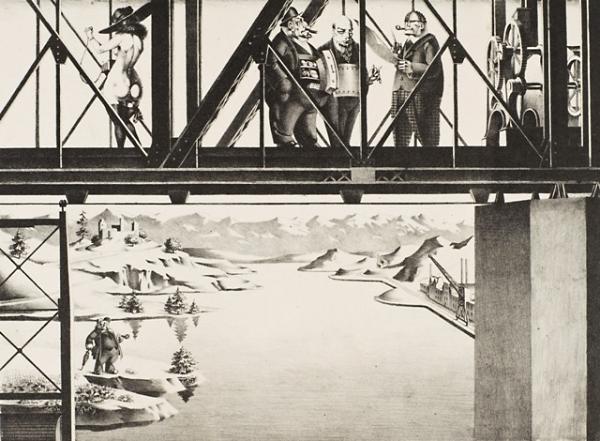
The Lords of the World
(Die Herren der Welt )
1922
Georg Scholz
b. Oct. 10, 1890
_______________________
How Occupy reinvented the language of democracy
Jerome Roos
... institutional critiques continue to miss the point. Occupy was first and foremost a symptom of the crisis of representation against which it arose. The emergence and resonance of its leaderless organizational form and its rejection of the political establishment should be attributed more to the failure of the present system than to the political orientations of the core activists themselves. The only reason the anarchist and horizontalist principles of Occupy’s early organizers resonated so widely is because the capitalist and institutionalist principles of liberal democracy have so utterly disqualified themselves that no one really believes in them any more. No leftist can still credibly claim to take the Democratic Party seriously as a vehicle for social change. Autonomy is simply our only alternative.
...(more)
Roar
_______________________

Alberto Giacometti
b. Oct. 10, 1901
portrait by Gordon Parks
1951
_______________________
Faster than the speed of print:
Reconciling ‘big data’ social media analysis and academic scholarship
Axel Bruns
Abstract
The promise of ‘big data’ has generated a significant deal of interest in the development of new approaches to research in the humanities and social sciences, as well as a range of important critical interventions which warn of an unquestioned rush to ‘big data’. Drawing on the experiences made in developing innovative ‘big data’ approaches to social media research, this paper examines some of the repercussions for the scholarly research and publication practices of those researchers who do pursue the path of ‘big data’–centric investigation in their work. As researchers import the tools and methods of highly quantitative, statistical analysis from the ‘hard’ sciences into computational, digital humanities research, must they also subscribe to the language and assumptions underlying such ‘scientificity’? If so, how does this affect the choices made in gathering, processing, analysing, and disseminating the outcomes of digital humanities research? In particular, is there a need to rethink the forms and formats of publishing scholarly work in order to enable the rigorous scrutiny and replicability of research outcomes?
First Monday
Volume 18, Number 10 - 7 October 2013 special issue 'Making data - Big data and beyond' _______________________
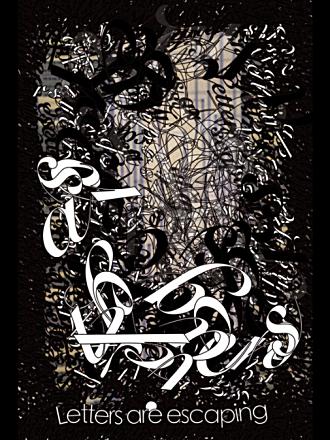
Letters Of Intent
Nico Vassilakis
scribd
_______________________
The space of the imagination
An interview with Lisa Jarnot
author of The Ambassador from Venus on the life and times of Robert Duncan
jacket2
_______________________
Ranciere – Anarchism, Para-Academia, Pure Politics, & the Non-Human
Jacques Ranciere interviewed by Duane Rousselle at Trent University
video
_______________________
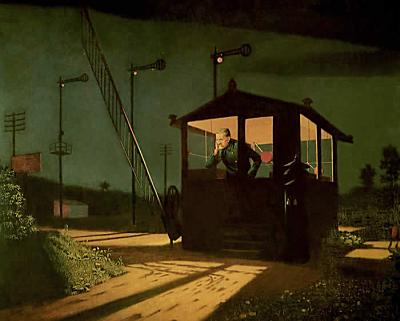
The house of gatekeeper
Georg Scholz
1924
_______________________
How Prisons Change the Balance of Power in America
The 14th Amendment, when combined with the War on Crime, has paradoxically disenfranchised vast swaths of the population and given the rural, white areas surrounding the prisons unforeseen political power.
Heather Ann Thompson
atlantic
(....)
With so many powerful arguments being made against our current criminal justice system, why then does it persist? Why haven’t the American people, particularly those who are most negatively affected by this most unsettling and unsavory state of affairs, undone the policies that have led us here? The answer, in part, stems from the fact that locking up unprecedented numbers of citizens over the last forty years has itself made the prison system highly resistant to reform through the democratic process. To an extent that few Americans have yet appreciated, record rates of incarceration have, in fact, undermined our American democracy, both by impacting who gets to vote and how votes are counted.
The unsettling story of how this came to be actually begins in 1865, when the abolition of slavery led to bitter constitutional battles over who would and would not be included in our polity. To fully understand it, though, we must look more closely than we yet have at the year 1965, a century later—a moment when, on the one hand, politicians were pressured into opening the franchise by passing the most comprehensive Voting Rights Act to date, but on the other hand, were also beginning a devastatingly ambitious War on Crime.
...(more)
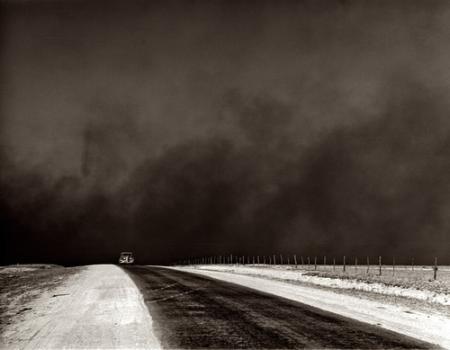
"Heavy black clouds of dust rising over the Texas Panhandle"
Arthur Rothstein
1915 -1985
1 2 3
_______________________
Dust and Exhaustion
The Labor of Media Materialism
Jussi Parikka
ctheory
(....)
This is a text about dust as well as exhaustion: about non-human particles as well as labor. It takes small things like dust as one vector for its argument, and as a vehicle in the manner of which we sometimes think through objects. Dust is, however, not quite an object, not in the intuitive sense that objects are supposed to be easily graspable. It does not fit the hand, even if it covers vast terrains. It is more environmental and better characterized as a milieu. Well, almost a milieu: we rarely count it among things that matter, but what if we did? What if we followed dust as a trajectory for theory -- theory that is concerned with materiality and media? What if dust is one way to do "dirt research": a mode of inquiry that crosses institutions and disciplines, and forces us to think of questions of design as enveloped in a complex ecology of economy, environment, work, and skill. Dirt brings noise, as Ned Rossiter reminds us, and dirt research can be understood "as a transversal mode of knowledge production [that] necessarily encounters conflict of various kinds: geocultural, social, political and epistemological."
(....)
This essay tracks this multiplicity of dust -- multiplicity not only in the sense that there is a lot of it, but in that it forces us to rethink such binaries as One/Many. Dust takes us -- and our thinking -- to different places and opens up multiple agendas. In this case, I use dust to talk of global labor, media materialism of digital culture, and how to approach this topic through such non-human nanoparticles. My argument routes itself through video games to factories, where gadgets are produced, to theoretical excavations in new materialism and speculative philosophy, to science fiction and the engineering of everyday realities. ...
(....)
This is not a text of theory so much as a text about non-humans that persistently concern the human. The non-human refuses to leave the human. This text subscribes to recent arguments that we need to rethink our theoretical perspectives from the point of view of things -- and, I would add, not only things, but also relations and almost-things, stuff that lacks the solidity to merit it being called just a thing.
...(more)
_______________________
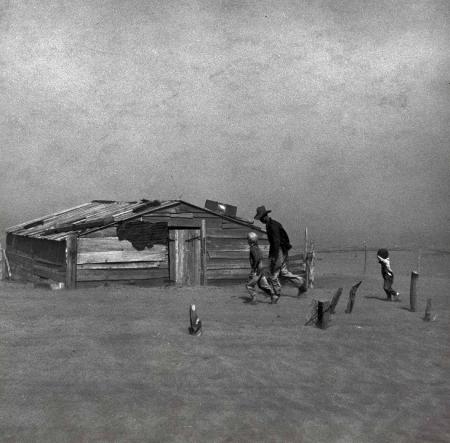
Dust Storm
Cimarron County, OK
Arthur Rothstein
1936
_______________________
Poetry isolation and collective clumsiness
An antonymic exploration
Maria Damon
(....)
“Tradition,” by which Eliot meant the Western literary canon, has been wisely reconceived here as the folksier and pluralized “poetry communities.” There are, indeed, traditions comprising paraliterary heritage, but they are largely anonymous and hence more interesting. But the individual talent? The invidious talon? The toxic infection? Talent’s etymology alone qualifies it for suspicion, as its travel from weight to currency to penchant to giftedness solidly implicates it in the world of commodities, while Eliot’s use of the word as metonymic for “person” or “poet” overdetermines its status as alienated labor, an extraction of one appealing and desired resource from the “standing-reserve” of the populace in exchange for prestige, professional advancement, reification as a name, and so forth.
Why resurrect this embodiment of an outmoded literary ambition almost half a century after Foucault wonders whose multiple and anonymous murmurs waft him downstream on the history of discourse? Individual talent is the corpse of the dross — Shelley or Orpheus bobbing along in the celestial stream of anonymity — solidifying on the surface of molten metal. The corpse itself is a cenotaph, marking some deeper and more diffuse locus of creative activity, until itself sinks, a Lycidas body without a place and a place without a body: in other words, a poem? The poem/object, like the individual talent, floats on unfathomable oceanic murmurs. Foucault writes:
I would have preferred to be enveloped in words, borne way beyond all possible beginnings. At the moment of speaking, I would like to have perceived a nameless voice, long preceding me, leaving me merely to enmesh myself in it, taking up its cadence, and to lodge myself, when no one was looking, in its interstices … I don’t want to have to enter this risky world of discourse; … I would like to feel it all around me, calm and transparent, profound, infinitely open … All I want is to allow myself to be borne along, within it, and by it, a happy wreck. ...(more)
Poetry Communities
A conference companion
... a companion to Poetry Communities and the Individual Talent, a conference that took place at the Kelly Writers House at the University of Pennsylvania on April 13–14, 2012. The feature includes versions of papers that were given as part of the conference, reviews and commentaries related to the conference, as well as articles, reviews, and interviews that relate to poetry and community more broadly.
_______________________
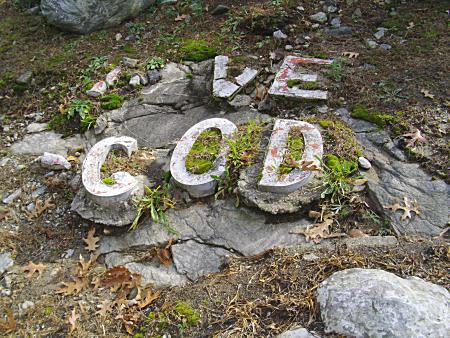
holy land USA
november 2009
Laura S. Marshall
Holy Land USA (Before & After):
The Abandoned Christian Theme Park
_______________________
God will continually withdraw before him, he says. God’s withdrawal will lead him on and on, until he has wandered every part of the godless world.
Wittgenstein Jr
_______________________
kierkegaardian
Alison Assiter interviewed by Richard Marshall.
3:AM
Alison Assitergoes all Crazy 88 on the deep philosophical issues of Code Pink and multi-culturalism, Althusser, enlightened women, pornography, Kierkegarrd’s metaphysics and politics, Kierkegaard’s naturalism and relationship to Kant, and love’s passion and deception. Gonzo.
(....)
The autonomous subject of liberal political theory is, in its original version, disembodied. This, of course, is not true of all variants of autonomy, but it seems to me that many contemporary versions of the theory suffer from a defect that stems from this original disembodied notion of the subject. Take for example this version: autonomy is the capacity to act on principles that are one’s own and one will exercise this capacity by means of a process of rational reflection on these principles. Autonomy is thought to be necessary for attributing political responsibility. However, there is a tendency, and I think this derives originally from Kant’s formulation, to equate this rational process with a process that is effected when doing good. It is difficult, on the framework therefore, to account for ‘autonomously’ doing wrong. Perspectives like that of Kierkegaard that tend to rely less on a ‘disembodied’ view of the self do not give rise to this problem.
...(more)
_______________________
Frank O'Hara and Kenneth Koch in Semi-Colon
John Latta
The Mirror Naturally Stripped
They are debating over the daffodil seeds
in history. Quaff these jeweled belches
for isn’t there whichness in the thinking apparatus
that glides towards cruelty as commonly as a bench?
...(more)
_______________________
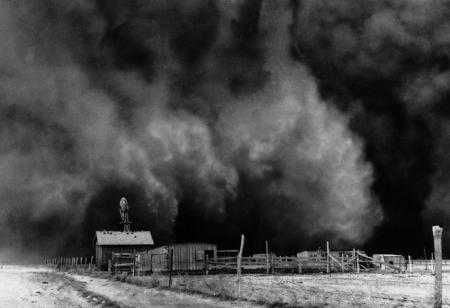
Arthur Rothstein
1935
_______________________
The attention economy
Tom Chatfield
aeon
How many other things are you doing right now while you're reading this piece? Are you also checking your email, glancing at your Twitter feed, and updating your Facebook page? What five years ago David Foster Wallace labelled ‘Total Noise’ — ‘the seething static of every particular thing and experience, and one’s total freedom of infinite choice about what to choose to attend to’ — is today just part of the texture of living on a planet that will, by next year, boast one mobile phone for each of its seven billion inhabitants. We are all amateur attention economists, hoarding and bartering our moments — or watching them slip away down the cracks of a thousand YouTube clips.
If you’re using a free online service, the adage goes, you are the product. It’s an arresting line, but one that deserves putting more precisely: it’s not you, but your behavioural data and the quantifiable facts of your engagement that are constantly blended for sale ......(more)
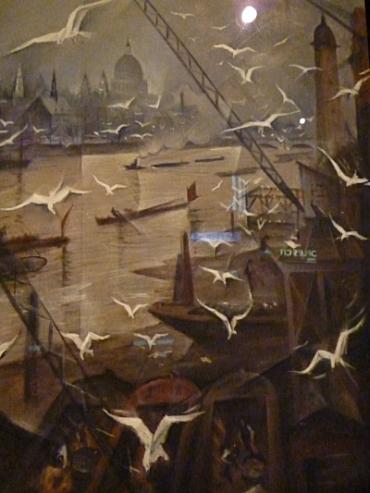
London, Winter
1928
Christopher Nevinson
d. October 7, 1946
_______________________
7 Classic Poems of Autumn
Identity Theory
7. “Spring and Fall” by Gerard Manley Hopkins
to a young child
MÁRGARÉT, áre you gríeving
Over Goldengrove unleaving?
Leáves, like the things of man, you
With your fresh thoughts care for, can you?
Áh! ás the heart grows older
It will come to such sights colder
By and by, nor spare a sigh
Though worlds of wanwood leafmeal lie;
And yet you wíll weep and know why.
Now no matter, child, the name:
Sórrow’s spríngs áre the same.
Nor mouth had, no nor mind, expressed
What heart heard of, ghost guessed:
It is the blight man was born for,
It is Margaret you mourn for.
...(more)
_______________________
Translation Notes: The Fata Morgana Books
Charlotte Mandell
Necessary Fiction
(....)
... one of my few Rules of Translation: Never read the book before I translate it. I read as I translate, so that the translation becomes more of a creative process: I’m creating the book in English as I’m reading it, learning it the way a reader would discover it. The way a writer writes it, one word at a time. When I’m done, of course, I go over my translation and revise again and again until I’m happy with the final draft. If I read a book beforehand, it would feel dead to me — and it would feel untranslatable. I like not knowing what comes next, both as a reader and as a translator.
...(more)
Charlotte Mandell
_______________________
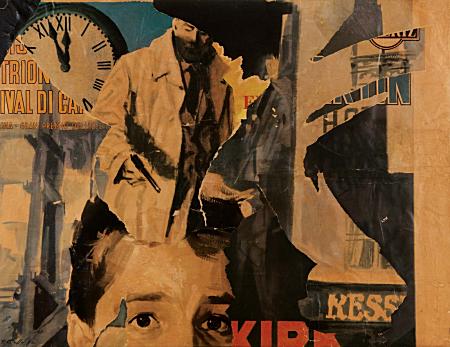
Minuit
Mimmo Rotella
_______________________
Process Processed, Josephine Berry Slater
—synthetic_zero
... If that which threatens human life can be thought of in terms of its own production, by way of reason, of processes which it can no longer control (total nuclear destruction, climate chaos, resource exhaustion, thanatopolitics), in other words if pathology is endemic to the human condition, then how are the resulting norms, retroactively given, discovered and deployed by art? Life is both what threatens life and what gives rise to an immunological and therapeutic response, and art participates on both sides of the divide: it gives form to the order that produces pathologies (the naturalisation of power occurring through naturalised cultural forms) and attempts to release life from its sickness (the grasping of norms from the flux by way of cutting, ‘partage’, the creation of visibilities, finding abscesses). When the key modality of art becomes its annexation of process (as an effect of a wider annexation of life within biopolitics and capitalist real subsumption, as well as science’s discovery that all is (in) process), how does its operation start to mutate? Norms are often proposed through postmodern art’s deployment of participation, but regularly precede/inform rather than result from process (bad relational aesthetics/new media’s concepts of interactivity). But at its wildest, the art of modernity opens itself to the destabilisation of its system by way of as yet unnormativised process which, in turn, gives rise to the discovery of new norms which can, albeit briefly, be turned against that which threatens both art and life. Thus aesthetic immunity acts for and against life.”
(....)
The swallowing up of 'world' by the processes unleashed by Enlightenment's dialectic – whose ultimate threat is extinction – also brings with it the discovery of life as the 'highest good'. In other words, life's drive to protect itself through the artifice of Ratio, leads back by way of this threat to the discovery that, through life, man remains related to all other living organisms. Zoe erupts at the heart of all systems, and through this becomes the target of politics, economics and culture in the era of biopolitics.
In taking us beyond the 'animal state' art eventually leads, through the embrace of means without ends, and a fascination with process, to the ambiguous vindication of life – the same destination as modern politics. For the conceptual line that develops out of Dada and Duchamp's related discovery of the readymade, this resolves into a distrust of the image whose conventions as well as its innovations are disparaged as matters of 'taste'. Perhaps counterintuitively, the vindication of life entails, in this genealogical branch, the elevation of thought by which artists can defend against repetition and the iterations of style which produce the differential field of taste, that aider and abetter of social conventions and stasis. Through nomination's inflation of thought, all of being is imaginatively subjected to art's procedures. To state it briefly, becoming can itself become a readymade, or, according to Duchamp's instructions: 'by planning for a moment to come (on such a day, such a date such a minute), "to inscribe a readymade" – The readymade can later be looked for. – (with all kinds of delays.) The important thing then is just this matter of timing, this snapshot effect, life a speech delivered on no matter what occasion but at such and such an hour. It is a kind of rendezvous.' ...(more)
_______________________
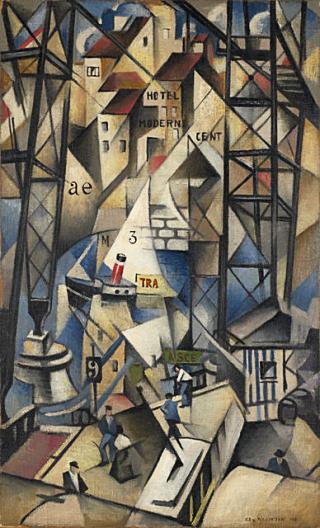
Christopher Nevinson
_______________________
Bigger Than That
(The Difficulty of) Looking at Climate Change
Rebecca Solnit
(....)
Sometimes I wish media stories were organized in proportion to their impact. Unfortunately, when it comes to climate change, there is not paper enough on this planet to properly scale up a story to the right size. If you gave it the complete front page to suggest its import, you would then have to print the rest of the news at some sort of nanoscale and include an electron microscope for reading ease.
Hold up your hand. It’s so big it can block out the sun, though you know that the sun is so much bigger. Now look at the news: in column inches and airtime, a minor controversy or celebrity may loom bigger than the planet. The problem is that, though websites and print media may give us the news, they seldom give us the scale of the news or a real sense of the proportional importance of one thing compared to another. And proportion, scale, is the main news we need right now -- maybe always.
As it happens, we’re not very good at looking at the biggest things. They may be bigger than we can see, or move more slowly than we have the patience to watch for or remember or piece together, or they may cause impacts that are themselves complex and dispersed and stretch into the future. Scandals are easier. They are on a distinctly human scale, the scale of lust, greed, and violence. We like those, we understand them, we get mired in them, and mostly they mean little or nothing in the long run (or often even in the short run).
...(more)
_______________________
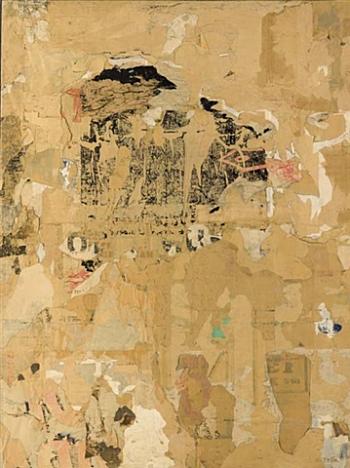
8 Sopra
Mimmo Rotella
7 October 1918 – 8 January 2006
_______________________
The Better Angels of Our Nature and an Evolutionary Response to Extremist Reactionaries
George S. Svokos
_______________________
On W. G. Sebald
Susan Sontag
IS LITERARY GREATNESS still possible? Given the implacable devolution of literary ambition, and the concurrent ascendancy of the tepid, the glib, and the senselessly cruel as normative fictional subjects, what would a noble literary enterprise look like now? One of the few answers available to English-language readers is the work of W. G. Sebald.
(....)
Where has one heard in English a voice of such confidence and precision, so direct in its expression of feeling, yet so respectfully devoted to recording "the real"? D. H. Lawrence may come to mind, and the Naipaul of The Enigma of Arrival. But they have little of the passionate bleakness of Sebald's voice. For this one must look to a German genealogy. Jean Paul, Franz Grillparzer, Adalbert Stifter, Robert Walser, the Hofmannsthal of "The Lord Chandos Letter," Thomas Bernhard are a few of the affiliations of this contemporary master of the literature of lament and of mental restlessness. The consensus about English literature for most of the past century has decreed the relentlessly elegiac and lyrical to be inappropriate for fiction, overblown, pretentious. (Even so great a novel, and exception, as Virginia Woolf's The Waves has not escaped these strictures.) Postwar German literature, mindful of how congenial the grandiosity of past art and literature, particularly that of German Romanticism, proved to the work of totalitarian mythmaking, has been suspicious of anything like the romantic or nostalgic relation to the past. But then perhaps only a German writer permanently domiciled abroad, in the precincts of a literature with a modern predilection for the anti-sublime, could indulge in so convincing a noble tone.
...(more)
via biblioklept
_______________________
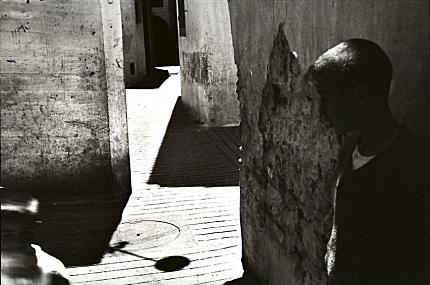
Henri Cartier-Bresson: The Early Prints
Edwynn Hauk Gallery
via gmtPlus9 (-15)
_______________________
The Curtains In The House Of The Metaphysician
Wallace Stevens
It comes about that the drifiting of these curtains
Is full of long motions: as the poderous
Deflations of distance: or as clouds
Inseperable from their afternoons;
Or the changing of light, the dropping
Of the silence, wide sleep and solitude
Of night, in which all motion
Is beyond us, as the firmament,
Up-rising and down-falling, bares
The last largeness, bold to see.
via Lumpy Pudding

flood
1946
Bernard Buffet
d. October 4,1999
_______________________
Interview With László Krasznahorkai
George Szirtes
the white review
... When I am not reading Kafka I am thinking about Kafka. When I am not thinking about Kafka I miss thinking about him. Having missed thinking about him for a while, I take him out and read him again. That’s how it works. It’s precisely the same with Homer, Dante, Dostoevski, Proust, Ezra Pound, Beckett, Thomas Bernhard, Attila József, Sándor Weöres and Pilinszky…
(....)
... we have no great literature. But readers need it, not as medicine, not as delusion, but because they need someone to tell them there is no medicine.
...(more)
_______________________
Artists, Eccentrics, Solitaries, and Saints:
On László Krasznahorkai’s Seiobo There Below
Andreas Isenschmid
Translated from the German by Michael Hulse
Excerpts from Seiobo There Below translated by Ottilie Mulzet
htmlgiant
... what we see here is yet one more balancing act by the great storyteller, László Krasznahorkai: just as he can be essayistic without slipping into didacticism, and emotional without turning bathetic, so too he remains wary of assigning the central position to his solitary and despairing characters, reserving that place to the current that tears everything with it—in one moment narrative, in the next meditative and interpretative—to the current of his prose.
_______________________
 Buster Keaton
b. October 4, 1895
Film
Samuel Beckett
1965
youtube
_______________________
Listening in Order Not to Hear? Darwin, Politics, and Sacrifice
Stefan P. Dolgert
Abstract:
Little seems to unite political theorists as diverse as Robert Axelrod (on the one hand), and Elizabeth Grosz and Isabelle Stengers (on the other) – game theorists and Deleuzean feminists are widely separated by matters of ontology, epistemology, and politics – yet both groups share in the resurgence of interest in the political salience of Charles Darwin. Though once considered a political theorist only in the crude manner of early 20th century eugenicists, Darwin is now seen across the political spectrum as an inspiring boundary-crossing figure. His description of the “numberless gradations” between human and animal consciousness betokens the breakdown of rigid dichotomies between nature and culture, science and the humanities, and human and nonhuman, so much so that E. O. Wilson could proclaim the inauguration of the era of “consilience.” Yet while there is much to applaud in the deconstruction of such polarities of artifice, we are left with many questions about the specific contours of this science/humanities chimera, in particular concerning the status of nonhumans in this new cosmopolis of human/nonhuman materialism.
(....)
Are nonhumans granted voice, given a place in a dialogue, only to have their interests ultimately sacrificed on behalf of that pseudo-voice? The irony, then would be that (Elizabeth) Grosz, who challenges the neoliberal reductionism of Axelrod’s game-playing cancer cells, is as embroiled in rituals of sacrifice as the game theorists she otherwise so skillfully debunks.
_______________________
In Search of Lost Tirades
Steve Danziger reviews The Kraus Project: Essays by Karl Kraus
Translated and Annotated by Jonathan Franzen
open letters monthly
_______________________
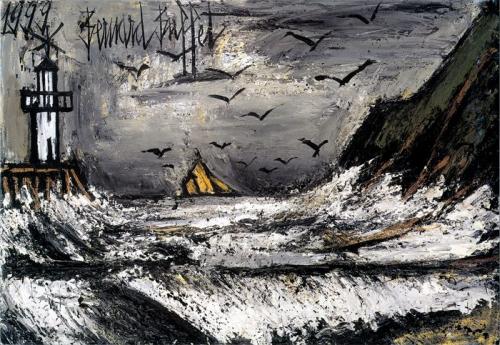
Tempête en Bretagne
1999
Bernard Buffet
_______________________
Inside the Museum of Broken Relationships
Linda Besner
Hazlitt
(....)
I love museums, personally, but I often see people gamely trudging through rooms of relics with their fidgety children, glazed eyes, and bulging fannypacks and wonder if they’re enjoying themselves at all. It seems like a quaint hangover from another time, when travel was an extension of one’s formal education; we are supposed to come back having learned something about Roman architecture, medieval ship-building, or Renaissance painting.
At Zagreb’s Museum of Broken Relationships, what we are supposed to learn is not confined to a particular drawer of history, boxed up with identifiable facts and figures. The museum’s mandate outlines a teaching mission that is both simple and wildly ambitious. “Our societies oblige us with our marriages, funerals, and even graduation farewells, but deny us any formal recognition of the demise of a relationship,” the curators write, and the museum is meant to create a public space for mourning the death of a relationship. They hope that the objects on display can “inspire our personal search for deeper insights and strengthen our belief in something more meaningful than random suffering.”
...(more)
_______________________
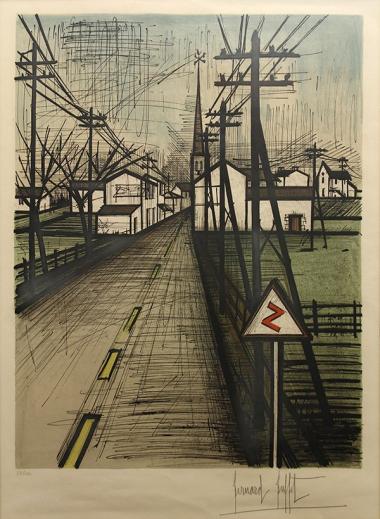
La Route
Bernard Buffet
1962
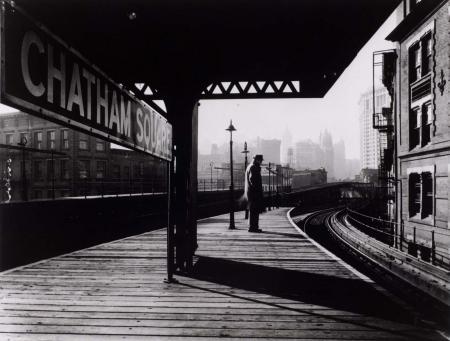
Chatham Square Platform
New York City, circa 1939
Arnold Eagle
1909 - 1992
_______________________
Thirty Years of Phoenix Poets, 1983 to 2012
An E-Sampler
Selected by University of Chicago Press Staff
.....................................................
from Crossing America by Bus (III)
[1988] from Paul Lake’s Another Kind of Travel
Then the bus stops. And the passengers jostle
toward the exit, stepping down
into heat and noise and the pain of missed connections.
Our luggage lost, we enter empty-handed
and swollen-footed, like Oedipus, into a strange city
with all the weight of time and distance on us
like a tragic curse, but which is merely
the condition we call human,
Cured by a long sleep.
Which is another kind of travel.
Only Connect: A Conversation With Paul LakeInterview by Joan Houlihan
The Shape of Poetry Paul Lake
Seven PoemsPaul Lake in The Poem Tree: An Online Poetry Anthology
_______________________
“Knight, Poet, Anarchist”
A new introduction to The Green Child, by Herbert Read
Eliot Weinberger
The introduction to The Green Child, a novel by Herbert Read,
first published in 1948 and released in a new edition on September 23 by New Directions.
In Yorkshire, where Herbert Read was born in 1893 on a remote farm at the western end of the Vale of Pickering, south of the moors and north of the wolds, young girls would pin ivy leaves together and throw them into wishing wells, and supernatural hares could only be killed with pellets of pure silver. Two sisters, nuns in the convent of Beverley, vanished into the moonlight on Christmas Eve and were found asleep at the convent door in May. A white horse would appear, hovering over the river, on the day someone would drown, and at night the bargest, the spectral hound, dragged its large and clanking chain. The images of two veiled women in white and a small child would flit from window to window in the Trinity Church, and the bells en route to St Hilda’s abbey, lost in a shipwreck, could still be heard from under the waters. There, the hapless cowherd Caedmon was instructed in a dream how to sing the origin of things and the dying William the Hermit performed his own burial; seven witches, in the shape of black cats and crows, possessed the daughters of Edward Fairfax, the translator of Tasso. It was said that a village — no one remembered its name — suddenly sank under a lake because it had refused hospitality to a poor beggar. The rivers were inhabited by kelpies, who claimed one human victim every year, and fairies played in Craven Dales among the Druid rocks of Almas Cliffe and the ancient burial mounds of Willy Houe.
At the age of ten, following the accidental death of his father, Read was torn from his enchanted pastorale and sent to the city of Halifax and the regimented hell of the Crossley & Porter Orphan Home & School, its walls black from the smoke of the surrounding factories. From the orphanage he moved into the vaster industrial desolation of Leeds to attend the university, and from there into the trenches of the First World War, where he was a decorated hero who carried a copy of Walden in his rucksack. Innocence and experience became lifelong themes in his work.
Masked by reticence and cloaked in tweeds, Read was the unexpectedly ardent and frighteningly prolific champion of nearly everything that was radical in the first half of the twentieth century: Imagism, Surrealism, abstraction, the Bauhaus, Marxism, anarchism, Freud and Jung, progressive education, Gandhian nonviolent resistance. Though now somewhat dimly remembered, he was, for decades, the Victoria Station of the arts, England’s primary explainer of the modern.
...(more)
_______________________
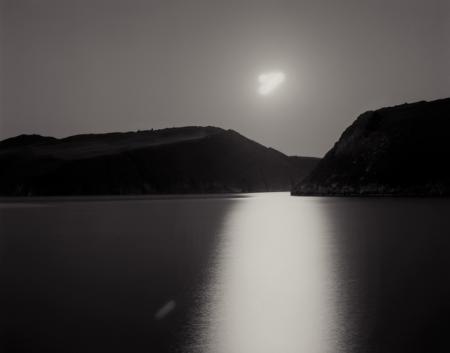
Moonrise, Lake Baikal,
Siberia, 1995
Prayer and Despair
Pradip Malde
via Idiotic Hat
_______________________
Wittgenstein Jr.
Nothingness, spreading over the English lawn. Nothingness adrift like some spore-bound plague.
An emptying of space. A voiding of time. Nihilism adrift, air-borne, spreading everywhere. Nihilism robbing the very sense of sense…
Nihilism. Meaninglessness alive. A kind of hollowing. An evacuation. A dispersal of atoms.
A turbulence in all things. A nausea of the world. A rocking. A kind of seasickness. The rising of the world’s bile.
Nothingness, frail but insistent… Whispering, but saying nothing… Nihilism. An anti-prayer. The eleven dimensions of the void unfolding…
_______________________
Feral politics: Searching for meaning in the 21st century
Matthew Flinders on George Monbiot’s Feral: Searching for Enchantment on the Frontiers of Rewilding
(....)
When stripped down to its basic components Feral is a treatise about re-engaging with nature and rediscovering our landscape by restoring and rewilding our ecosystem. This process might range from changing farming and fishing methods away from a hegemonic monoculture through to reintroducing certain animals such as wild boar, lynx, and wolves to certain parts of Western Europe. Unlike the bleak pessimism of a great deal of environmental writing Monbiot charts away out of ecological decline by allowing nature to return to a wilder less predictable form. This new positive environmentalism offers a way to re-conceptualize the world around us — to redefine the art of living — in relation to the physical landscape. But it also offered much more. The problem was that for at least a week I couldn’t quite put my finger on what exactly this ‘more’ element was or why it mattered. And then the party political conference season opened in the United Kingdom and everything became clear.
In essence, George Monbiot’s book is not about boar and bears but about the art of living in the twenty-first century. It is about how we live our lives, how we define what matters and whether, deep down, we are satisfied by a world based around ever-increasing consumption. The simple fact would seem to suggest that we are not satisfied. The World Health Organization rates clinical depression as one of the main health challenges for the twenty-first century, while in the United Kingdom the most common cause of death amongst young men is suicide. To rewild or turn feral is not therefore just about reconnecting with the landscape but it is also about reconnecting with yourself.
...(more)
_______________________
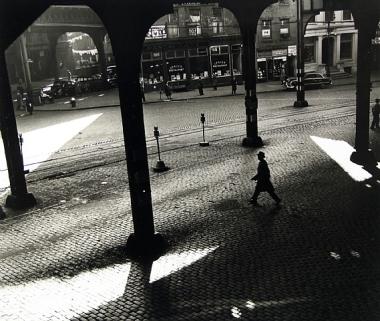
Under the 3rd Ave. El
Rebecca Lepkoff
1947
Book Review:
Life On the Lower East Side: Photographs By Rebecca Lepkoff, 1937-1950
- _______________________
The Coming Collapse Into Love And Equality
Phil Cubeta
gift hub
(....)
A quarter of the US population, not including the NSA, and not including Markets4Good, or Hewlett Foundation, or Gates Foundation, are engaged in guard labor, measuring, managing, and demoralizing the persons once known as citizens, when in Paris, the baker saluted the butcher on the way to the next beheading. Violence is now intimate, pervasive, internalized, and structural. Those deformed by metrics achieve manic intensity as they explain why the only hope for fixing what capitalism broke is the tool capitalism used to break it. In touring around talking about giving, sometimes to church groups, addressing fundraisers, I find that the language of love comes to them like blood flowing into numb arms and legs. ......(more)
a response to A Practical Utopian’s Guide to the Coming Collapse
David Graeber [from The Baffler No. 22, 2013]
_______________________
The End of Public Space
Prashanth Kamalakanthan and Daniel LoPreto
full-stop
(....)
Above all, the American surveillance state reflects the ongoing privatization and enclosure of public spaces. It’s certainly important to criticize America’s “surveillance net” in the context of the decline of personal privacy and the loss of civil liberties. But it is also crucial to identify the role of contemporary capitalism in destroying public space and the centrality of public space in making true democracy possible.
(....)
Why, then, is there so little resistance? What explains the disengagement of the youth, the complicity of broader society? Looking strictly at the NSA scandal and direct reactions concerning the violation of privacy seems to miss the larger picture. There is in fact a vibrant resistance, and youth engagement with questions of authoritarianism and the commons is deeper than ever before. But to appreciate the true scope of the struggle — and to situate ourselves within it — we need to expand our focus to the cultural and economic forces that enable communications surveillance and the increasingly fragmented society that contextualizes it.
(....)
We should be thankful for the light Edward Snowden has shone on the American surveillance state, because with each new story the ugliness of its true scale becomes a little clearer. Taking a step back, it becomes clear that state surveillance is only a symptom of a much deeper disease. To focus simply on its immediate costs – deterioration of privacy, tactical inefficacy – is not enough. The destruction of the commons and the privatization of public space is an equal, if not much more serious, danger. As the concept of insurgent citizenship helps illustrate, these are the vital areas where democracy actually happens, where popular sovereignty takes root.
...(more)
_______________________

Louisiana Story production still
1948
Arnold Eagle
_______________________
Words without Borders
October 2013: African Women, Indigenous Languages
Ode to Jean Arthur Rimbaud
Pablo Neruda
Translated from Spanish by Ilan Stavans
Now,
this October
you will turn
a hundred,
harrowing friend.
May I speak
to you?
I’m alone,
through my window
the Pacific breaks
its eternal threatening thunder.
It is night.
The burning firewood throws
over the oval
of your old portrait
a fugitive ray.
You are a child
of twisted locks,
sour mouth.
I apologize
if I talk to you
the way I am, the way
I trust you would be today,
if I talk of marine water
and of burning firewood,
of simple things and simple beings.
...(more)
_______________________
Riff on Thomas Bernhard’s Old Masters
Ryan Chang
biblioklept
Out of the four of five Bernhard works I’ve read, Old Masters is so far the least enjoyable, at least in terms of “heart.” Concrete and The Loser were both concerned with acceptance of one’s limits, his/her incapacity to be great in the face of their insistence on trying to get there. Here, it is mainly the folly of aesthetic representation, and how achievement and authority in an “old master” is false and arbitrary and patronizing. It seems like it is the most obvious excuse for Bernhard to rage against the art world, and of art making in general. On a formal level, though, it might be the clearest example of what Bernhard repeatedly performs: it is a “staged fiction,” insofar that techniques of theater are implemented through the mode of the “novel.” Bernhard, as always, beautifully writes paradox, ambivalence, and futility in this seamless meshing of form and content. This is the structural dipole–its largest–that is mirrored within the text on levels of theme, syntax, and joke.
The form itself–an uninterrupted stream of text, information, echo, relay, rumor, etc.–is a stage. There is only a transparent illusion that a story in the conventional sense will be performed; really, a hyperbolic anecdote will tell us about the story that will be told. The anecdote of omniscience.
...(more)
_______________________

Just Drifting
1939
Adolf Fassbender
1884-1980

Poststation
Ulf Puder
2011
1 2
via Biblioklept
_______________________
View With a Grain of Sand
Wislawa Szymborska
1923 - 2012
We call it a grain of sand,
but it calls itself neither grain nor sand.
It does just fine, without a name,
whether general, particular,
permanent, passing,
incorrect, or apt.
Our glance, our touch means nothing to it.
It doesn't feel itself seen and touched.
And that it fell on the windowsill
is only our experience, not its.
For it, it is not different from falling on anything else
with no assurance that it has finished falling
or that it is falling still.
The window has a wonderful view of a lake,
but the view doesn't view itself.
It exists in this world
colorless, shapeless,
soundless, odorless, and painless.
The lake's floor exists floorlessly,
and its shore exists shorelessly.
The water feels itself neither wet nor dry
and its waves to themselves are neither singular nor plural.
They splash deaf to their own noise
on pebbles neither large nor small.
And all this beheath a sky by nature skyless
in which the sun sets without setting at all
and hides without hiding behind an unminding cloud.
The wind ruffles it, its only reason being
that it blows.
A second passes.
A second second.
A third.
But they're three seconds only for us.
Time has passed like courier with urgent news.
But that's just our simile.
The character is inverted, his hasts is make believe,
his news inhuman.
The Poet and the WorldWislawa Szymborska Nobel Lecture, December 7, 1996
On Szymborska
Czeslaw Milosz
(....)
For me, Szymborska is first of all a poet of consciousness. This means that she speaks to us, living at the same time, as one of us, reserving her private matters for herself, operating at a certain remove, but also referring to what everybody knows from one’s own life. For do we not remember our undressing before a medical examination, or our wondering at coincidences, or reading letters of people who are no more? Hence, as if in drawings that capture scenes of familiar everyday events, we recognize ourselves in these poems as beings kindred to each other, with a subjectivity which is different in each person and which exists, as it were, between parentheses. We are related also because we are contemporaries, thus submitted to the same circuit of information. Words—orientation signals—mean more or less the same to us: the theory of evolution, spaceships, Hiroshima, but also Homer, Vermeer, or the uncertainty principle, namely, a whole repertory of notions we receive at home, at school, in the mass media.
Szymborska’s poems are built through juggling, as if with colored balls, the components of our common knowledge; they surprise us with its paradoxes and show the human world as tragicomic. The consciousness that finds its expression in them is a consciousness after—after Darwin, after Einstein, after many others—for, after all, the civilization in which we live submerged preserves their traces. Confronted with poetry so insouciantly dancing, as if written effortlessly, we hesitate to mention the landmarks of science, yet because they have existed, Szymborska’s thought and our thought, whether we wish it or not, is complex and devious. Nowhere is this better seen than where she questions the place of man in the chain of evolution. Thus, for instance, the poem “Four in the Morning” opposes our anxiety, not allowing us to sleep, to the automatic busying of ants.
...(more)
_______________________

photo - mw
_______________________
Hermeneutics as Embodied Existence
Marja Schuster
Abstract
This article explores the possibilities and limits of a hermeneutic way of being in the world, more specifically being a researcher as a part of human, embodied existence. Understanding existence as embodied highlights the subjectivity of a researcher. For a hermeneutic researcher this subjectivity is both a precondition for interpretation and something that might endanger the scientific endeavour. In this article, I examine the possibilities of combining Hans-Georg Gadamer’s empathetic hermeneutics with Paul Ricoeur’s critical hermeneutics as a means of both recognizing and, to some extent, controlling my subjectivity in the research process. With Gabriel Marcel I also argue for hermeneutics as an embodied experience. This is exemplified by my study with a focus on the existential dimensions of the nursing profession. The first part of the article introduces Marcel and his philosophical anthropology concerning our bodily existence as essential for shared lives with others. In the second part, this understanding of self and others is further developed by means of the hermeneutics of Gadamer and Ricoeur. In the third part, I present a way of applying hermeneutics in procedures for interviews, transcription, and analysis of data.
International Journal of Qualitative Methods
Vol 12 (2013)
_______________________

Emilio Pettoruti
b. October 1, 1892
_______________________
From Mandelstam Variations
Ian Dreiblatt
conjunctions
(....)
it is like a part of a person
the opposite of coward is forest
strata careen into the margins
your mouth & it’s april
I’m listening
you take a black pill
you ride a spectrum say hello
everything mountains
everything listening
if you don’t do something
something bad can happen
to this everything opens its eyes
I am speaking into the pupil
I am jumping into a hole
...(more)
_______________________
Introducing Surge
Ron Silliman
(....)
DuPlessis notes that, having permitted Pound to hack away at the body of The Waste Land,
Eliot changed the poem definitively once more…. Eliot completed his own poem by adding the notes inside it… He thereby fixes his own queer poem by framing it with rhetorics of scholastic mastery; he also extends the range of the poem by a powerful, authoritative, and influential subjectivity. In the notes, a highly literate and literary voice claims an allusive comprehensive engorgement of masterworks of European culture.
This revision, DuPlessis suggests, may have been as crucial as Pound’s edits.
So it is no surprise, I suppose, in reading Surge: Drafts 94 – 114, the final volume in DuPlessis’ 26-year-long masterwork, to find that there is indeed an index here, and that it appears as Draft 113, which is to say that, unlike Zukofsky let alone Eliot, it fully acknowledges its own status as poem, even if it plays with the full sleight of hand, being not the final section at all – Draft 114 immediately follows, although that also is neither the 114th poem of the project, nor the final text of DuPlessis’ in this marvelous book. There are, after all, notes, and, earlier on than this volume, the curious Unnumbered, Précis, which a parenthetical note at the bottom of the poem’s graphic grid – page 169 and its true last page – indicates as “after 57, before 58.” The actual final words of this poem.
...(more)
_______________________

photo - mw
_______________________
The Sparks of Rebellion
Chris Hedges
(....)
We must develop a revolutionary theory that is not reliant on the industrial or agrarian muscle of workers. ...
(....)
It is not the poor who make revolutions. It is those who conclude that they will not be able, as they once expected, to rise economically and socially. This consciousness is part of the self-knowledge of service workers and fast food workers. It is grasped by the swelling population of college graduates caught in a vise of low-paying jobs and obscene amounts of debt. These two groups, once united, will be our primary engines of revolt. Much of the urban poor has been crippled and in many cases broken by a rewriting of laws, especially drug laws, that has permitted courts, probation officers, parole boards and police to randomly seize poor people of color, especially African-American men, without just cause and lock them in cages for years. In many of our most impoverished urban centers—our internal colonies, as Malcolm X called them—mobilization, at least at first, will be difficult. The urban poor are already in chains. These chains are being readied for the rest of us. “The law, in its majestic equality, forbids rich and poor alike to sleep under bridges, beg in the streets or steal bread,” W.E.B. Du Bois commented acidly.
(....)
The most important dilemma facing us is not ideological. It is logistical. The security and surveillance state has made its highest priority the breaking of any infrastructure that might spark widespread revolt. The state knows the tinder is there. It knows that the continued unraveling of the economy and the effects of climate change make popular unrest inevitable. It knows that as underemployment and unemployment doom at least a quarter of the U.S. population, perhaps more, to perpetual poverty, and as unemployment benefits are scaled back, as schools close, as the middle class withers away, as pension funds are looted by hedge fund thieves, and as the government continues to let the fossil fuel industry ravage the planet, the future will increasingly be one of open conflict. This battle against the corporate state, right now, is primarily about infrastructure. We need an infrastructure to build revolt. The corporate state is determined to deny us one.
...(more)
|






































